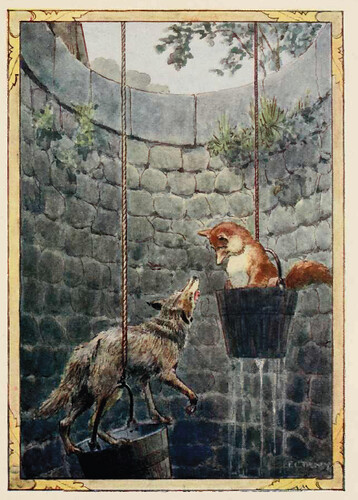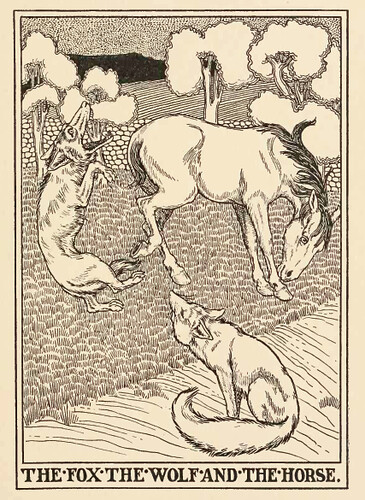The Wolf and the Fox
Why Aesop gave the palm of cunning
Over flying animals and running
To Renard Fox, I cannot tell,
Though I have searched the subject well.
Has not Sir Wolf an equal skill
In tricks and artifices shown,
When he would do some life an ill,
Or from his foes defend his own?
I think he has, and, void of disrespect,
I might, perhaps, my master contradict:
Yet here's a case, in which the burrow-lodger
Was palpably, I own, the brightest dodger.
One night he spied within a well,
Wherein the fullest moonlight fell,
What seemed to him an ample cheese.
Two balanced buckets took their turns
When drawers thence would fill their urns.
Our fox went down in one of these,
By hunger greatly pressed to sup,
And drew the other empty up.
Convinced at once of his mistake,
And anxious for his safety's sake,
He saw his death was near and sure,
Unless some other wretch in need
The same moon's image should allure
To take a bucket and succeed
To his predicament, indeed.
Two days passed by, and none approached the well;
Unhalting Time, as is his wont,
Was scooping from the moon's full front,
And, as he scooped, Sir Renard's courage fell.
His crony wolf, of clamorous maw,
Poor fox at last above him saw,
And cried, "My comrade, look you here!
See what abundance of good cheer!
A cheese of most delicious zest!
Which Faunus must himself have pressed,
Of milk by heifer Io given.
If Jupiter were sick in heaven,
The taste would bring his appetite.
I have taken, as you see, a bite;
But still for both there is a plenty.
Pray take the bucket that I have sent you;
Come down, and get your share."
Although, to make the story fair,
The fox had used his utmost care,
The wolf (a fool to give him credit)
Went down because his stomach bid it —
And by his weight pulled up
Sir Renard to the top.
We need not mock this simpleton,
For we ourselves such deeds have done:
Our faith is prone to lend its ear
To anything which we desire or fear.
Over flying animals and running
To Renard Fox, I cannot tell,
Though I have searched the subject well.
Has not Sir Wolf an equal skill
In tricks and artifices shown,
When he would do some life an ill,
Or from his foes defend his own?
I think he has, and, void of disrespect,
I might, perhaps, my master contradict:
Yet here's a case, in which the burrow-lodger
Was palpably, I own, the brightest dodger.
One night he spied within a well,
Wherein the fullest moonlight fell,
What seemed to him an ample cheese.
Two balanced buckets took their turns
When drawers thence would fill their urns.
Our fox went down in one of these,
By hunger greatly pressed to sup,
And drew the other empty up.
Convinced at once of his mistake,
And anxious for his safety's sake,
He saw his death was near and sure,
Unless some other wretch in need
The same moon's image should allure
To take a bucket and succeed
To his predicament, indeed.
Two days passed by, and none approached the well;
Unhalting Time, as is his wont,
Was scooping from the moon's full front,
And, as he scooped, Sir Renard's courage fell.
His crony wolf, of clamorous maw,
Poor fox at last above him saw,
And cried, "My comrade, look you here!
See what abundance of good cheer!
A cheese of most delicious zest!
Which Faunus must himself have pressed,
Of milk by heifer Io given.
If Jupiter were sick in heaven,
The taste would bring his appetite.
I have taken, as you see, a bite;
But still for both there is a plenty.
Pray take the bucket that I have sent you;
Come down, and get your share."
Although, to make the story fair,
The fox had used his utmost care,
The wolf (a fool to give him credit)
Went down because his stomach bid it —
And by his weight pulled up
Sir Renard to the top.
We need not mock this simpleton,
For we ourselves such deeds have done:
Our faith is prone to lend its ear
To anything which we desire or fear.
The Fox, the Wolf, and the Horse
A fox, though young, by no means raw,
Had seen a horse, the first he ever saw!
"Ho! neighbour wolf," said he to one quite green,
"A creature in our meadow I have seen —
Sleek, grand! I seem to see him yet —
The finest beast I ever met."
"Is he a stouter one than we?"
The wolf demanded, eagerly;
"Some picture of him let me see."
"If I could paint," said fox, "I should delight
T" anticipate your pleasure at the sight;
But come; who knows? Perhaps it is a prey
By fortune offered in our way."
They went. The horse, turned loose to graze,
Not liking much their looks or ways,
Was just about to gallop off.
"Sir," said the fox, "your humble servants, we
Make bold to ask you what your name may be."
The horse, an animal with brains enough,
Replied, "Sirs, you yourselves may read my name;
My shoer round my heel has writ the same."
The fox excused himself for want of knowledge:
"Me, sir, my parents did not educate —
So poor, a hole was their entire estate.
My friend, the wolf, however, taught at college,
Could read it were it even Greek."
The wolf, to flattery weak,
Approached to verify the boast;
For which four teeth he lost:
The high raised hoof came down with such a blow,
As laid him bleeding on the ground full low.
"My brother," said the fox, "this shows how just
What once was taught me by a fox of wit —
Which on your jaws this animal has writ:
All unknown things the wise mistrust."
Had seen a horse, the first he ever saw!
"Ho! neighbour wolf," said he to one quite green,
"A creature in our meadow I have seen —
Sleek, grand! I seem to see him yet —
The finest beast I ever met."
"Is he a stouter one than we?"
The wolf demanded, eagerly;
"Some picture of him let me see."
"If I could paint," said fox, "I should delight
T" anticipate your pleasure at the sight;
But come; who knows? Perhaps it is a prey
By fortune offered in our way."
They went. The horse, turned loose to graze,
Not liking much their looks or ways,
Was just about to gallop off.
"Sir," said the fox, "your humble servants, we
Make bold to ask you what your name may be."
The horse, an animal with brains enough,
Replied, "Sirs, you yourselves may read my name;
My shoer round my heel has writ the same."
The fox excused himself for want of knowledge:
"Me, sir, my parents did not educate —
So poor, a hole was their entire estate.
My friend, the wolf, however, taught at college,
Could read it were it even Greek."
The wolf, to flattery weak,
Approached to verify the boast;
For which four teeth he lost:
The high raised hoof came down with such a blow,
As laid him bleeding on the ground full low.
"My brother," said the fox, "this shows how just
What once was taught me by a fox of wit —
Which on your jaws this animal has writ:
All unknown things the wise mistrust."
(600 words)

